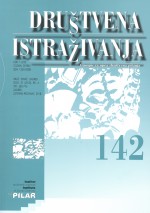OVISNOST O VJEŽBANJU – DOPRINOS PERFEKCIONIZMA I ODSTUPAJUĆIH NAVIKA HRANJENJA
EXERCISE DEPENDENCE – THE ROLE OF PERFECTIONISM AND DISORDERED EATING
Author(s): Ivana GARILOVIĆ, Ivana MacukaSubject(s): Evaluation research, Health and medicine and law, Sports Studies
Published by: Institut društvenih znanosti Ivo Pilar
Keywords: exercise dependence; perfectionism; disordered eating;
Summary/Abstract: Despite the physical and psychological benefits of exercise, recent evidence has been gathered on the downsides of this healthy habit in the form of exercise dependence. Exercise dependence is an uncontrolled urge for exercising and satisfying that urge becomes the ultimate goal in everyday life and, consequently leads to the loss of beneficial effects of exercise. This study contains validation of the Exercise Dependence Scale (Hausenblas & Symon Downs, 2002b) used for the first time on a Croatian sample for measuring exercise dependence symptoms. In an online conducted research 281 women participated, mean age of 22 years (SD = 2.70). The aim of this study was to examine the contribution of perfectionism and disordered eating in explaining exercise dependence symptoms. The conducted analyses identified personal standards, doubt about actions, and dieting as significant individual predictors for exercise dependence. More precisely, participants with higher personal standards, more doubts about their actions, and those who often engage in dieting tend to experience more exercise dependence symptoms. Perfectionism dimensions and disordered eating aspects explained 23% of the exercise dependence variance.
Journal: Društvena istraživanja - Časopis za opća društvena pitanja
- Issue Year: 27/2018
- Issue No: 4
- Page Range: 713-733
- Page Count: 21
- Language: Croatian

